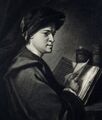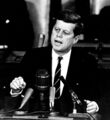Template:Selected anniversaries/May 29: Difference between revisions
From Gnomon Chronicles
No edit summary |
No edit summary |
||
| Line 30: | Line 30: | ||
File:John F. Kennedy moon mission speech.jpg|link=John F. Kennedy (nonfiction)|1917: Politician [[John F. Kennedy (nonfiction)|John F. Kennedy]], 35th President of the United States, born. | File:John F. Kennedy moon mission speech.jpg|link=John F. Kennedy (nonfiction)|1917: Politician [[John F. Kennedy (nonfiction)|John F. Kennedy]], 35th President of the United States, born. | ||
File:Arthur Stanley Eddington.jpg|link=Albert Einstein (nonfiction)|1919: [[Arthur Eddington (nonfiction)|Arthur Eddington]] and Andrew Claude de la Cherois Crommelin view a solar eclipse as a test of [[Albert Einstein (nonfiction)|Einstein's theory of general relativity. | File:Arthur Stanley Eddington.jpg|link=Albert Einstein (nonfiction)|1919: [[Arthur Eddington (nonfiction)|Arthur Eddington]] and Andrew Claude de la Cherois Crommelin view a solar eclipse as a test of [[Albert Einstein (nonfiction)|Einstein]]'s theory of general relativity. | ||
||John Charles Harsanyi (b. May 29, 1920) was a Hungarian-American economist. He is best known for his contributions to the study of game theory and its application to economics, specifically for his developing the highly innovative analysis of games of incomplete information, so-called Bayesian games. He also made important contributions to the use of game theory and economic reasoning in political and moral philosophy | ||John Charles Harsanyi (b. May 29, 1920) was a Hungarian-American economist. He is best known for his contributions to the study of game theory and its application to economics, specifically for his developing the highly innovative analysis of games of incomplete information, so-called Bayesian games. He also made important contributions to the use of game theory and economic reasoning in political and moral philosophy | ||
Revision as of 08:17, 29 May 2018
1569: Astronomer Tycho Brahe uses Gnomon algorithm techniques to make improved astronomical observations.
1777: Physician and engineer John Mudge elected a Fellow of the Royal Society, and in the same year was awarded the Copley medal for his 'Directions for making the best Composition for the Metals for reflecting Telescopes; together with a Description of the Process for Grinding, Polishing, and giving the great Speculum the true Parabolic Curve'.
1917: Politician John F. Kennedy, 35th President of the United States, born.
1919: Arthur Eddington and Andrew Claude de la Cherois Crommelin view a solar eclipse as a test of Einstein's theory of general relativity.




